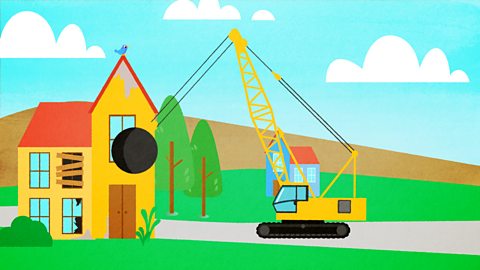Adventurous Ahmed gets to grips with verbs.
Verbs
A verb describes an action, state or occurrence.
This is Ahmed. Ahmed isn’t doing anything. Ahmed is not a verb. Ahmed is a noun. In fact, Ahmed is a proper noun. But if Ahmed does something then we have a verb.
So do something, Ahmed. [Bell rings] Ah, perfect. Ahmed goes fishing. ‘Goes’ is a verb. It describes the action Ahmed is doing. He baits his hook, he casts his line and he waits.
Which gives us a chance to tell you a useful little tip.
One way of checking is a word is a verb is to add ‘ing’ to the end of the word and see if it still works. Bait – baiting. Cast – casting. Wait – waiting.
And after all that, Ahmed is still ‘waiting’.
Ah, Ahmed is finally ‘catching’ a fish.
Hold on, that’s not a fish. Oh no, Ahmed is catching an alligator. ‘Don’t panic, Ahmed. Run, run Ahmed, run.’ Ahmed is running.
[Aargh!]
If you remembered the ‘ing’ rule, you’d know that ‘run’ is definitely a verb. So remember this snappy definition. A verb describes an action, state or occurrence.
‘Eat’ is also a verb.
[Crunch].
Video summary
Part of a series of animated films following a cast of characters’ adventures and mishaps as they get to grips with grammatical terms.
In this film, Adventurous Ahmed goes fishing and catches more than he bargained for whilst discovering what verbs are.
Teacher Notes
Focus on the use of verbs in a given literary text.
Explore the use of more adventurous verbs.
Ask students to rewrite sentences replacing common verbs with more adventurous and interesting ones.
This clip is useful for teaching English at Key Stage 2 and Key Stage 3 and the equivalent in Northern Ireland, Wales and Scotland.
Adjectives. video
Big Dave gets to grips with adjectives.

Pronouns. video
Big Dave gets to grips with pronouns.

Prepositions. video
Space Cadet Carl and Selena Stardust get to grips with prepositions.
